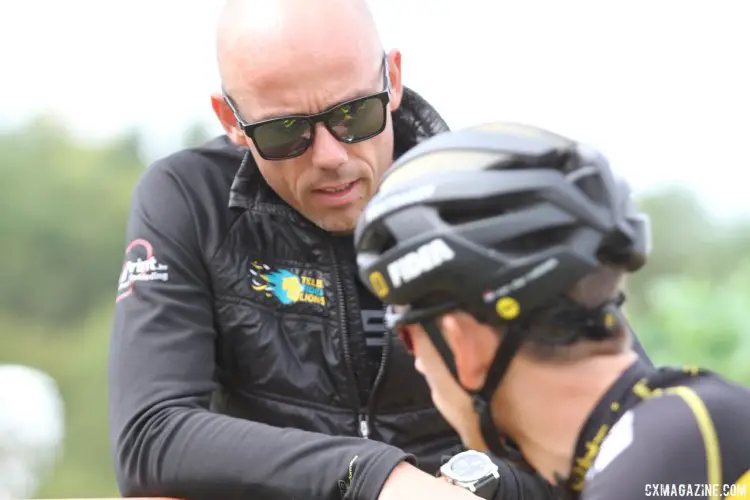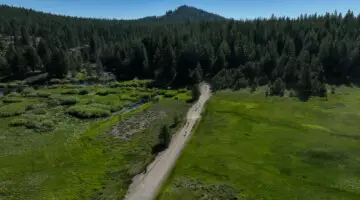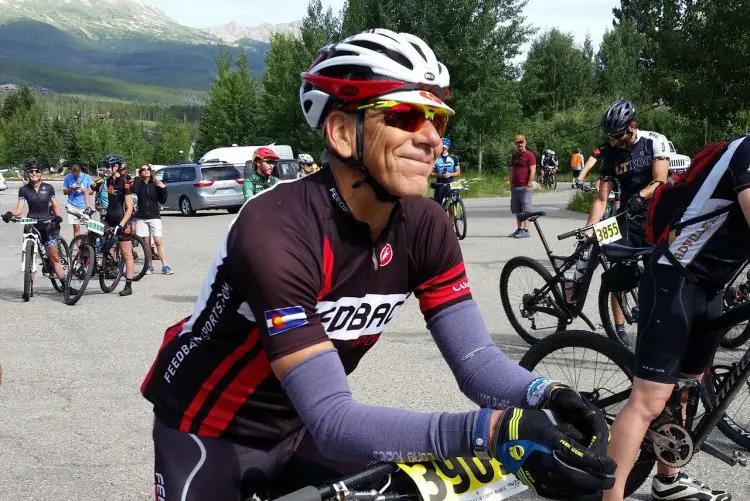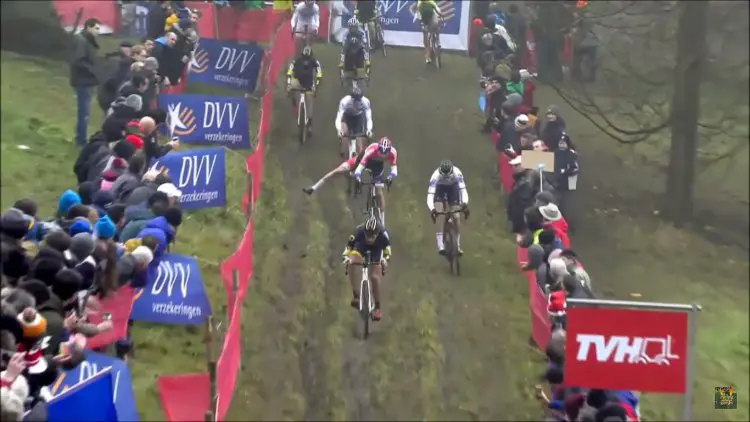by Lee Waldman
One of the aspects of cyclocross that keeps me racing and training is the mindfulness this discipline requires. Power, strength, speed and technique are crucial, but being a successful ’crosser also requires strategic thinking.
Some find the key to success as a racer comes as the result of working with a coach. Others are more comfortable coaching themselves. Both approaches have their pros and cons. For the past 8 years, I’ve made the choice to be coached and it’s proven to have been a good choice—at least for me.
To Get Coached or Not to Get Coached
“Do I really need a coach?” I struggled with that question for years until I finally jumped off the fence and found one. Among the riders I regularly compete against, I believe there is an equal split. Some have a coach, some are looking for one and some are convinced that they don’t need one.
There are any number of cyclocross racers out there, and you might be one of them, who has made the choice for financial or other reasons, to go it alone. If that’s the case, don’t feel that you’ve missed the bus. Given the correct perspective of yourself as a rider, and with some careful planning, self-coaching is a very viable option.
Please don’t misunderstand, there are certainly ways working with a coach will help. If you’re a new cyclocrosser, you might struggle with technique, with race strategy, with creating training plans or with any of the other multitude of skills that we all needed to learn when we began racing ’cross. In that case, having a coach and mentor will flatten your learning curve. There are things that are simply more easily learned with someone next to you to guide you.
Then there’s the group of riders who have been racing for a few years. They have learned some technique either through trial and error, YouTube, or they might have worked informally with an experienced rider. They have race experience and have learned strategy the hard way. They have experimented with any number of the “off the shelf” training plans—the ones found online, in the magazines or bookstores. They still feel as if they’re missing some key piece of information.
Chasing “The Secret”
For me, it was the fear that someone out there knew the secret. If I could simply work with that person, then all the gaps in my training and racing would magically be erased.
I’m also cursed with an annoying tendency to overtrain. I needed a coach to help me make the “right” decisions around training; when to go hard, when to rest, etc. I had read everything I could find yet I still wasn’t sure of myself. I was convinced that an impartial voice could help.
That might be you, and you might then be thinking, “I should stop reading now and start looking for a coach.” And you might be right. But even if that’s true, there are steps you can take for yourself that might make having a coach more productive.
In my other life, I work with college teachers as an instructional coach. My job is to help them move from where they are now as teachers to where they would like to be. I pay attention to the specific ways they think and act that can help me understand why and how a teacher teaches in a specific way.
That self-awareness in your training and racing, whether you coach yourself, or work with a coach, will help you move towards your goals. Now I’m going to ask you now to actively suspend any disbelief you might have, at least until you are done reading.
I began searching for a coach armed with some specifics. I needed someone who knew the sport from the ground up, who had a deep understanding of physiology and training methods and an individual who could motivate me and help me motivate myself.
Finally, I wanted someone who would know me as an individual, not simply a client.
Five Things to Look for in a Coach
There are some specific ways of thinking that I look for in my teachers and in myself. I’m going to suggest that you consider them as well.
They are:
- Craftsmanship
- Efficacy
- Consciousness
- Flexibility
- Interdependence
These five things might not sound as if they have anything to do with cyclocross, but they do. And they will smooth the path of working with a coach or coaching yourself. Armed with this self-knowledge, you will more easily be able to make decisions that will move you towards your cyclocross goals.
First, let’s address the 500-pound gorilla in the room. We hire coaches specifically for their experience and their toolbox of skills and strategies. They have what we need and might not have.
Most of us read the books and the magazine articles related to training and racing, We watch the YouTube videos of UCI races looking to discover what those guys do that we cannot. In reality, we have the same tools at our disposal as the experts! We just have not accessed them, yet.
This is where those five ways of thinking fit nicely. They can be instrumental in having a coach or coaching yourself. Let’s take a look.

Being open to self-growth is important. 2017 Jingle Cross World Cup © D. Mable / Cyclocross Magazine
Craftsmanship: If you’re a craftsman, you continually work to perfect your craft, in this case racing your cyclocross bike. The only way any coaching relationship can work is if the coachee, you, is willing to put in the time to fully develop. There is no magic bullet here.
Ask yourself: “How committed am I to uncovering my best?” If you are not committed, stop reading now. If you are willing to work to get better, then keep going. You are on the path to successfully coaching yourself.
Whether you work on your own, or with a coach, you will keep searching in all the nooks and crannies to find any way to hone your skills. It might be YouTube, or the newest book on cyclocross technique or it might possibly be picking your coach’s brain ad infinitum. However you do it, craftsmanship will send you down the road to improvement.
Efficacy: Do you believe that if you work hard enough, you can make a difference in your racing? Or are you one of those people who feels as if there is some magic that you just do not have.
I have written before about the difference between a growth and fixed mindset. With a fixed mindset, you are of the opinion that you either “have it” or you do not and nothing that you do can change that fact. If you have a growth mindset, then you know that the harder you work, the better you will become.
You have to believe! If you do not, it does not matter who is coaching you. Without that feeling that “I can do this,” you’re destined to fall short. So, work on efficacy before even opening any training book, blog or video.
Consciousness: How aware are you of your strengths and weaknesses and how they impact your training and racing? Maybe you may have great cornering skills, but anytime you have to dismount for an unrideable section, you struggle. Or perhaps your slow starts put you in a bad spot every race.
There are any number of videos that will show you how to conquer your particular obstacles. Let’s be honest, your coach isn’t going to stand there and hold your hand through that learning process unless you are paying a fortune. Be conscious your limiters and search out the information that will help you coach yourself.
Flexibility: There are different paths to achieving the same result, and accepting this fact is a must for cyclocross growth. You have to be willing to change horses in midstream. If something is not working for you, find a different path to your desired result. If the line you found in your pre-ride suddenly disappears, look for a new one. Simple as that. You know yourself and you know what works.
On the other hand, be willing to try different approaches. If you are working with a coach, follow their advice even when you’re not sure. If you have decided to go it alone, be willing to try something new. I’m not advocating that you jump on the bandwagon for each and every new and “improved” idea. But keep an open mind. When we stop learning, we stop improving.
Interdependence: If you are strong in interdependence you know that you can benefit from working with others. Whether it is the coach you have hired, an experienced rider who is willing to mentor you or a teammate offering you advice, there are multiple ways to find information. Take advantage of them. They will pay dividends in the long run whether you implement them yourself or through a coach.
Be Open to Growth and It Will Come
Take a minute and consider how each of these five factors can help in your coach-assisted or personal growth as a bike racer. Any coach would love to work with a client who works hard to perfect their skillset. They would be thrilled to know that you are aware of your strengths and your weaknesses.
I know from my experience coaching educators, the easiest to help growth are those teachers who believe they can do it, no matter what “it” is. You may have your coach ask you to try some things that you haven’t thought about. Or, if you have, then you have discarded those ideas. Coaches like riders who are open and flexible.
Last, but not least, your working relationship with a coach yields benefits if you allow yourself to develop a strong, interdependent relationship.
You may be that rider who decides to go it alone. I admire you. You have much more self-discipline and self-assurance than I do. That said, think about those five strengths. They are, in my opinion, the foundation of a positive self-coaching experience.
And in the meantime, please go for a ride.
Lee Waldman is a regular columnist for Cyclocross Magazine. See an archive of all his previous work.






























